Understanding Celebrity Scams: What to Look Out For
Scam protection expert Lukas Jackson explains what to look out for in new scams.
In this article...
- And yet another scam is out to get your cash or your crypto
- This scam uses celebrities to gain trust and attention
- Here's what to look out for.
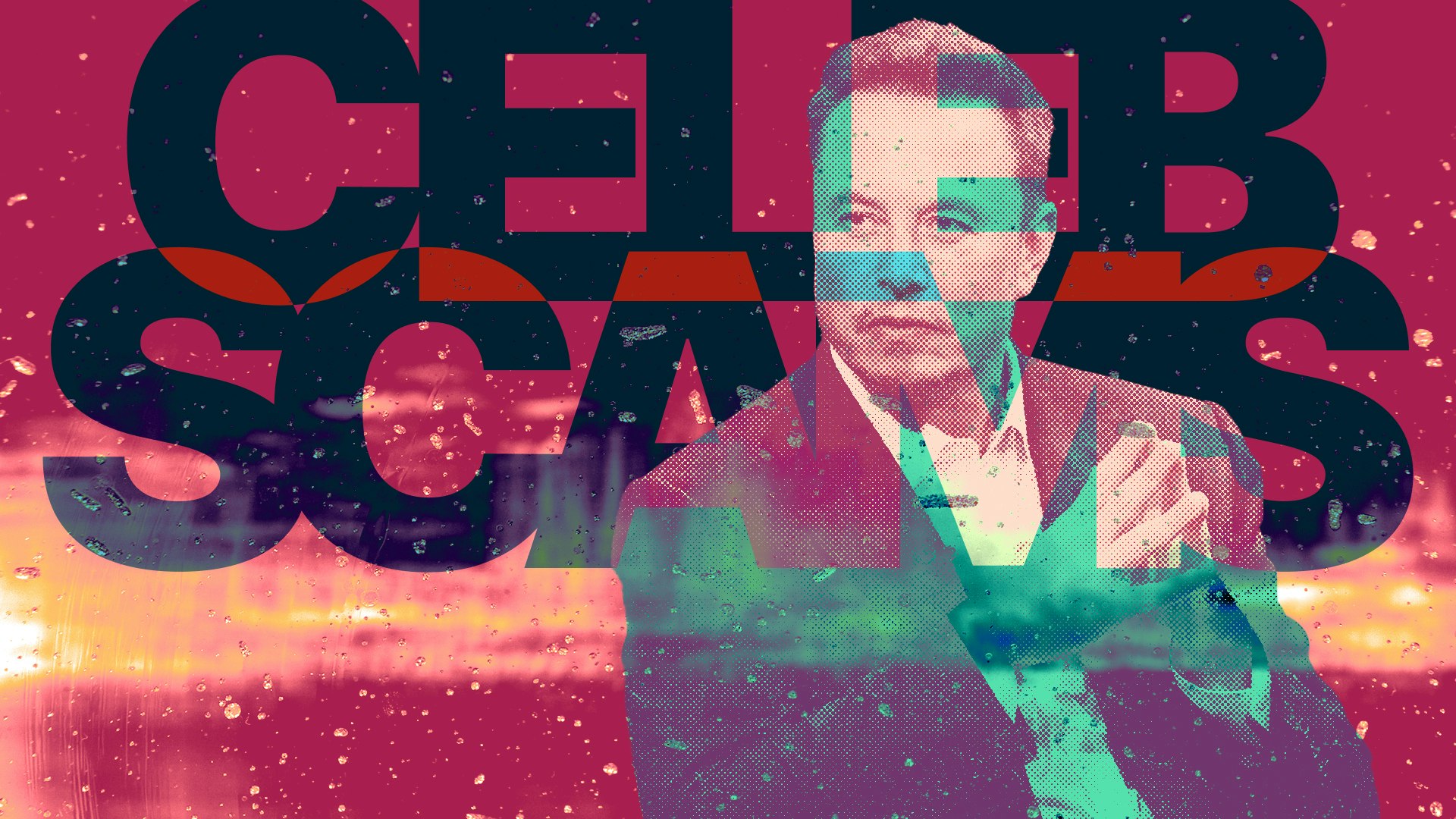
In recent years, Australia has witnessed an explosion of digital financial opportunities, with promises of easy profits and revolutionary technologies. It’s exciting to see the new possibilities in cryptocurrency and fintech, but with every opportunity comes risks — and scammers are getting smarter.
Let's look at an example to understand how these scams work and how to protect yourself.
Fake celebrity endorsements
The images attached to this post showcase a concerning trend: Scammers using well-known public figures like Elon Musk to lure unsuspecting individuals into fraudulent schemes. Here’s one:
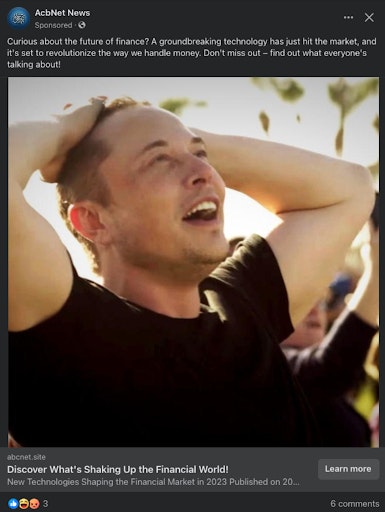
In this ad, Elon is depicted with an excited expression, paired with text like "A groundbreaking technology has just hit the market, and it's set to revolutionise the way we handle money!"
This kind of messaging is designed to create a sense of urgency and excitement. Scammers often fabricate stories claiming that celebrities have invested in or endorsed a financial product, cryptocurrency platform, or automated trading service. In this case, “Bitcoin Loophole” is promoted — a platform that falsely promises users can extract maximum profitability with ease.
What makes these scams effective?
Familiar faces and brands
Using faces like Elon Musk gives these ads a sense of legitimacy. But it’s important to remember that if it seems too good to be true, it probably is.
Urgency and Fear of Missing Out (FOMO)
Ads will often claim that this "new technology" is the next big thing and that only a limited number of people will benefit if they act fast. This FOMO tactic pressures individuals into making impulsive decisions.
Promises of quick riches
The idea of earning millions from the comfort of your home, with minimal effort, is highly appealing, especially in times of financial struggle. Scammers exploit this desire by making it seem like a foolproof way to make money. Here’s the “news article” you visit when you click the ad:
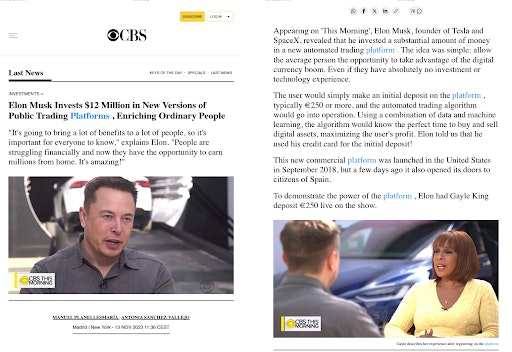
When you click any of the hyperlinks on the page, it takes you to another website, which is where you lose your money:
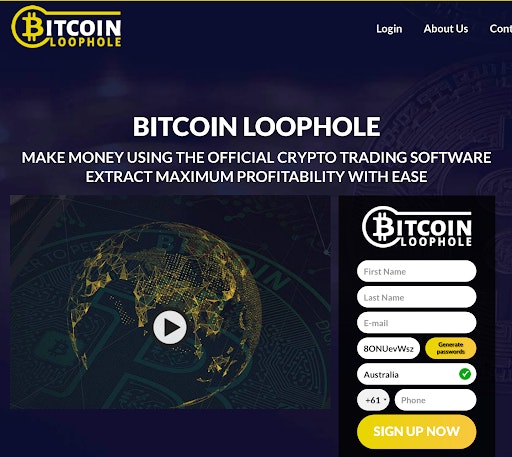
How to spot a scam
Look beyond celebrity endorsements
Always check if the celebrity or public figure has actually endorsed the product or service. Official social media channels or news sources can help you verify the legitimacy of the claims.
Question unrealistic promises
Any platform that guarantees huge returns with little effort should be treated with extreme scepticism. Real investments always carry risk, and no one can predict the market with certainty.
Check for fake news websites
The second image portrays what looks like a legitimate CBS News website article, claiming Elon Musk invested $12 million in a public trading platform. Upon closer inspection, this is not a real article from CBS but a cleverly disguised scam site. Always double-check the URL and cross-reference the information with trusted sources.
Read the fine print
Scammers often make claims that sound legitimate, but the details are where you’ll find the red flags. Look out for terms that are too vague, like "maximum profitability with ease," and promises that don’t explain how their system works. You’ll also find the fake website doesn’t have a solid Privacy Policy or Terms and Conditions.
Protect yourself
Research before you invest
Use trusted sources and financial experts to guide your investments. Avoid platforms that are promoted primarily through social media ads or spammy websites.
Be cautious with your personal information
Scammers may try to gather personal details through these fake platforms. Always ensure the sites you visit are secure and legitimate.
Report suspicious ads
If you see ads like the ones shown, report them to the platform where they appear (e.g., Facebook) and let others know about the scam.
By staying informed and vigilant, you can avoid falling victim to these elaborate schemes. Remember, if it sounds too good to be true, it probably is. Protect yourself and others by spreading the word about these scams. Together, we can reduce the impact these fraudsters have on our communities.
About the author - Lukas Jackson
Lukas Jackson is a leading expert in compliance with over 5 years of experience in crypto, AML/CTF regulations and scams prevention. Actively involved in initiatives focused on scam prevention and public education, Lukas has a passion for protecting individuals from online threats. With a focus on raising awareness and developing strategies to combat scams, Lukas is committed to driving efforts that help people recognise and avoid scams.

Suggested Articles

Scam Uses Popular Anime Characters to Steal Your Money or Crypto
Have you seen your favourite character in an ad online? It might not be a legitimate use of the image. Here are the red flags to look for.Read more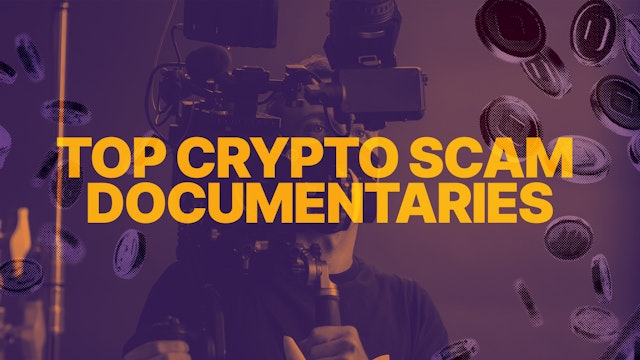
Top Documentaries To Watch to Increase Scam Awareness
Here are some crypto scam documentaries you need to add to your to-do list. Read more
Crypto ATMs: How to Protect Yourself from a Growing Scam Risk
The number of victims of crypto ATM scams are on the rise. Here's what to look out for. Read moreBrowse by topic
CoinJar’s digital currency exchange services are operated by CoinJar Australia Pty Ltd ACN 648 570 807, a registered digital currency exchange provider with AUSTRAC.
CoinJar Card is a prepaid Mastercard issued by EML Payment Solutions Limited ABN 30 131 436 532 AFSL 404131 pursuant to license by Mastercard. CoinJar Australia Pty Ltd is an authorised representative of EML Payment Solutions Limited (AR No 1290193). We recommend you consider the Product Disclosure Statement and Target Market Determination before making any decision to acquire the product. Mastercard and the circles design are registered trademarks of Mastercard International Incorporated.
Google Pay is a trademark of Google LLC. Apple Pay is a trademark of Apple Inc.
This site is protected by reCAPTCHA and the Google Privacy Policy and Terms of Service apply.

